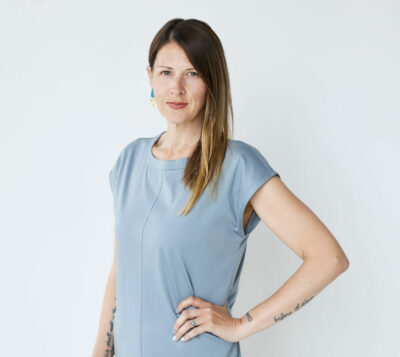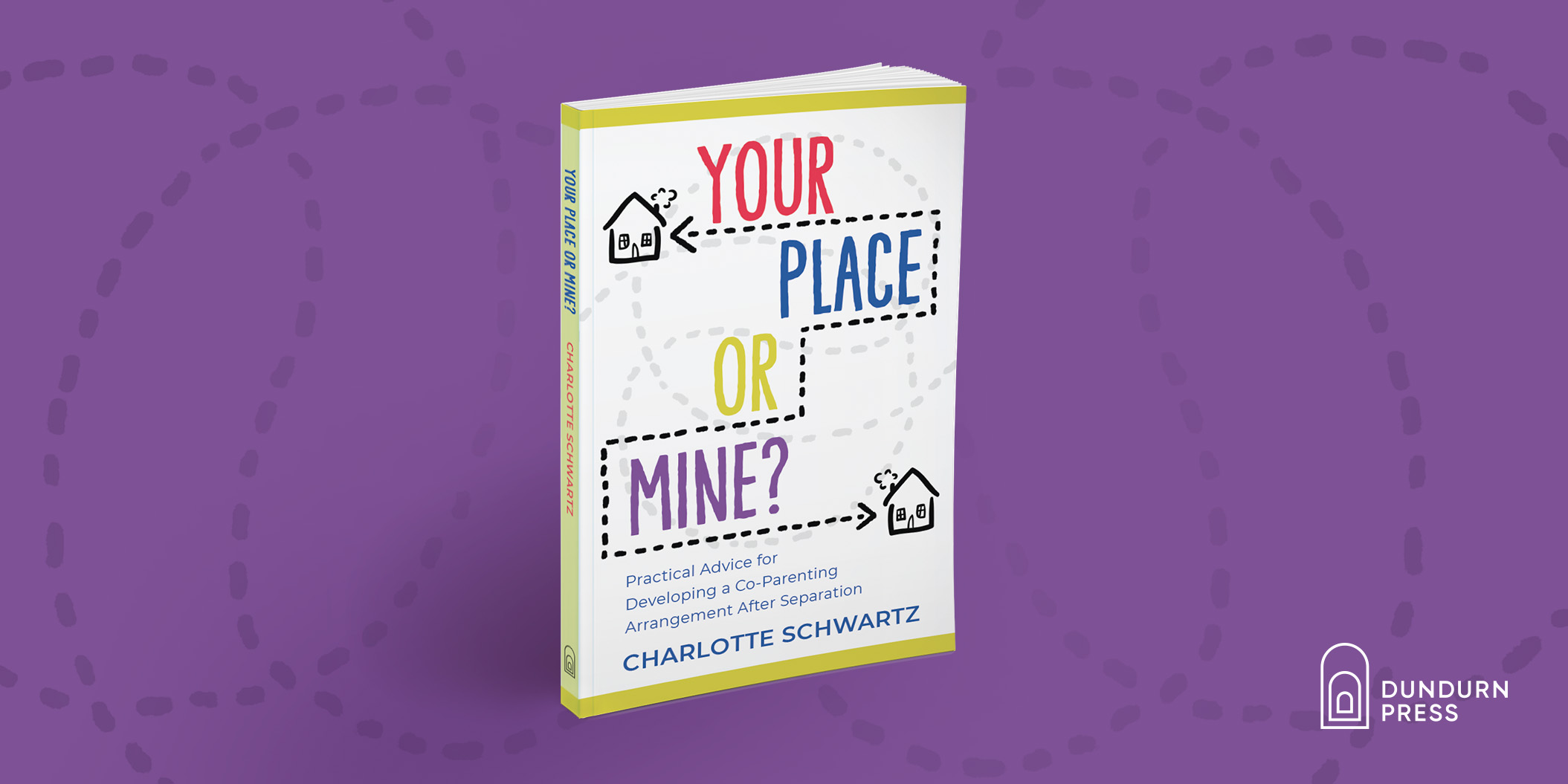No matter how amicable you may be with your ex, separation is a painful and messy affair. If you have kids, it’s exponentially more difficult (like 100x harder).
As a mother who’s lived through it, Charlotte Schwartz knows how challenging it can be. As a law clerk, Charlotte has also seen firsthand which approaches work better than others. Her book Your Place or Mine? is the resource she wished she’d had, and we think it’s essential reading for parents who are trying to figure out how to navigate separation and divorce while also prioritizing their children’s wellbeing. Charlotte’s book answers the question most parents ask: how do I do this without forever fucking up my kids?
While no book can guarantee how things will turn out, Your Place or Mine? is a detailed resource for separating parents, written in a remarkably honest and heartfelt way. This book will help you navigate the legal system—including negotiating a settlement, mediation, and litigation, and explains the nuances of different paths to dispute resolution. It also provides you with specific advice about what to include in a compassionate separation agreement, and helps you feel less alone on this traumatic journey (separation and divorce are traumatic!).
Knowing how many of you are in search of a book like this, we connected with Charlotte, who has written for Shedoesthecity in the past, to ask her some things. As always, her responses are thoughtful and chock-full of wisdom.

What made you want to write this book?
6 years ago, when I was working through my own life-altering separation, I didn’t know how important it was to have a support system. My first thought was to head to the bookstore and look through the self-help section. I remember sitting on the floor in the “divorce” aisle (that I think they purposefully put in the back of the store) and noticing that the books were either written by doctors (psychologists) or lawyers, but rarely by real people who had some expertise and were also living the principles of co-parenting in real-time. The ones that did have that theme tended to skew “live, laugh, love” (which isn’t me) or otherwise had a religious bent (which also isn’t me). Then, after managing to find my way through a separation and a divorce and coming to terms with co-parenting, that old lightbulb went off after a particularly funny co-parenting mix-up, and I decided to write about my own experiences both personally and professionally.
When someone, a friend or colleague, shares with you that they’re likely going to divorce, what’s the first thing you often say to them?
I always ask them first how they are feeling. It’s an important question to gain insight. If their first response is “angry”, you know they need some time to cool down and you hope it doesn’t get ugly in the meantime (spoiler: sometimes it does anyway). But if their first response is something more along the lines of “scared” or “sad” or “confused”, you know that it’s likely they want to do things in the most friendly, least conflict-heavy way.
I always tell people that they are going to be OK, and that their kids are going to be OK, but that in order for that to happen, they need to do it right from the start. With young kids, you don’t have a year or two to sort yourself out and decide how to act towards your spouse: every minute counts, and acting in the most child-focused way, right away, is really important.
For you now, with lived experience, what’s the toughest part?
The most challenging piece for me, in the early days, was accepting that a shift had come in my life where I wouldn’t physically see my young kids every single day anymore: I wouldn’t wake up in the middle of the night and tip-toe into their rooms to make sure they were still breathing every night, I wouldn’t have to make them a school lunch every night, and I wouldn’t put them to bed every night. I won’t lie—that part was heartbreaking. As I say in the book, I think the hardest thing for parents who are separating is acknowledging that they feel the way they feel, in part, because when they were planning their lives together, they never imagined a day would come when they wouldn’t see their kids every day. It is devastating initially, but you figure it out with the right support in place and good advice.
How does someone get good at mediation, at negotiating with a partner about time, responsibilities etc.?
This is such a great question. Even the most watertight separation agreement or parenting plan can’t possibly check every single box every single day, though we do try hard to achieve that level of precision. The prevailing guide has to be what is best for the kids, reasonably. Sometimes life (work travel, funerals, sick parents, sick kids, year-long school closures because of pandemics…) gets in the way of our best-laid plans; being able to calmly walk and talk through these occurrences with your co-parent is so important. But sometimes a special opportunity, a theatre or concert ticket or family reunion/wedding, etc. will come up and it might not be during the time that your child is with you. But you really want them to share in that experience. It comes down to the basics: is it great for your child to be able to go to the family wedding and see their extended family and cousins and friends? Of course it is! Is it something you can work out? You bet. Be creative and find a solution that is good for everyone but, mostly, for your kid.
Like in all things in life, the more you work the muscle, the stronger you’ll be. Setting aside whatever differences and focusing on what’s best for your kid is the priority; making sure to focus on the issue at hand (instead of attaching it to a zillion other issues) is also important, and an exercise that gets easier with time. The more you learn to concede and collaborate, the easier it gets, like any skill.
For parents, I think the number one worry is will my kid(s) be okay? Will this trauma forever fuck them up? What do you want to say to that?
I have been asked this question so many times in the last 2.5 years—I don’t know if it’s the pandemic or my age demographic, but an inordinate number of friends and acquaintances and friends of friends seem to be embarking on a separation or divorce right now. My answer is always the same – YES – your kids will be OK. BUT— that is completely contingent on how you act NOW. Take care of yourself in the background but, like all things parenting, put your kid first. Put your own issues aside, your opinions and resentments about your ex, whatever, and remember that your child deserves the best that both of their parents can give them.
In your opinion, should parents inform teachers when going through a separation/divorce?
Absolutely. Hopefully, your kid has a teacher who is compassionate, observant, and patient, and willing to keep an eye out for any changes in your child’s behaviour as a result of the changes at home. Children handle stress in ways that make almost no sense to adults, and knowing how well your child is doing is a bit mystifying if you can’t be a fly on the wall during their school day. If you’re handling the circumstances with your former spouse well, the chances are, your kid is ok. But it’s helpful to have another trusted adult keeping an eye out for your kid.
Obviously, this is a different answer for everyone, but how do you know that separation and divorce is the way to go?
This is a tough one, but I’ll try my best. Having two little kids close together, including one disabled one, placed a ton of stress on our relationship, and took a tremendous amount of resources, time, and dedication to manage. In the end, it often meant there was nothing left for “us”. We each tried to deal with things in our own ways and the communication really broke down from there, until we were both just really unhappy. We tried some things, though not everything, to fix it, and it just didn’t work out. All this to say, when it’s done, it’s done. You’ll know, even if it’s heartbreaking and gutting, you’ll still know.
Aside from your excellent book, what are some resources in Toronto that you recommend?
We have really excellent parenting mediators in Toronto. Some of my favourites are Seema Jain, Deborah Graham, and Christine Kim.
The Healing Collective is a Toronto-based collective of therapists (family therapists, marriage therapists, and therapists who work with children) with a number of therapists on their roster and with whom they match interested parties. Many of their therapists are working online and thus distance is not necessarily a barrier, and some work on a sliding fee scale. I mention this because it is incredibly important, even semi-frequently, to have a supportive professional involved in your care, and particularly with respect to your mental health. I think that working on this in tandem with your divorce will give you tools to work through the legal pieces with more composure, objectivity, and ease than you would otherwise be able to.
Collaborative Divorce Toronto is a super useful site for information on collaborative family law process, and a directory of lawyers who practice it in the city (with links to other cities, provinces, etc.)
And, should you find yourself in a court process, I’m exceptionally proud of a programme led by my boss at 361 University Avenue courthouse called “ASC Toronto” — advice and settlement counsel project. This is a program where talented, experienced family law lawyers provide summary (brief) legal advice on matters in court, and who you can later retain at a lower hourly rate if you need to proceed through court.
Anything else you want to share?
Yes! Often when I speak about what I do, or what my book is about, I’ll get this response: “OH, but Charlotte, you haven’t met MY ex”. Listen, maybe you’re right, but I promise I have met your ex, or someone like them. Your ex, and their bad attitude, or their weird relationship with their mother, or their pathological lying, or their narcissism, or their aggression… is nothing new. They’re not special. But you are, and you should protect your energy, and move forward in a process that will actually see results.
If you’re dealing with a “bully”, remember this: bullies are always intent on wearing you down until you give up, capitulate, and walk away. But usually only once a ton of damage has been done. Knowing that beforehand is useful, because it will help you to understand their strategies. If they’re the argumentative type, don’t engage. If they’re aggressive, make sure your communication is all in writing (by email or text). Chances are, they’re sad or angry, and they know they’re losing so much. Holding the tiniest bit of space for that, even when you really don’t want to, might prove helpful.
Your Place or Mine? by Charlotte Schwartz will be released on September 27, and is available to pre-order now.



 Follow Us On Instagram
Follow Us On Instagram
